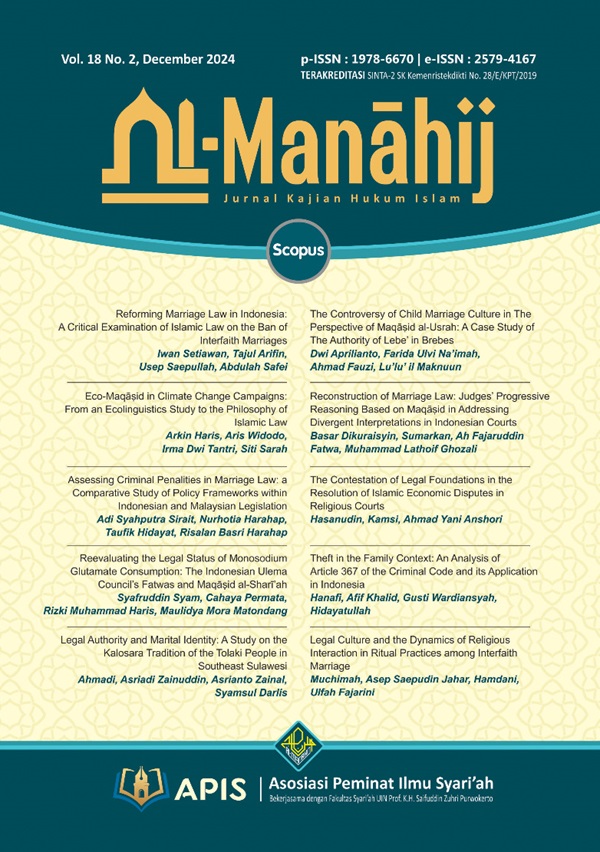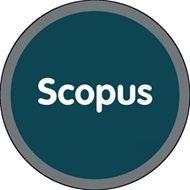Reevaluating the Legal Status of Monosodium Glutamate Consumption: The Indonesian Ulema Council’s Fatwas and Maqāṣid al-Sharī’ah
DOI:
https://doi.org/10.24090/mnh.v18i2.11121Keywords:
Monosodium glutamate, MUI Fatwa, Maqāṣid al-Sharī’ahAbstract
This article examines the consistency of the MUI Fatwa regarding Monosodium Glutamate (MSG) from a Maqāṣid al-Sharī’ah standpoint. The legal issue addressed in this research arises from the ongoing debate regarding the consumption of MSG. The Indonesian Ulema Council (MUI) has issued a fatwa declaring that MSG consumption is permissible (halal), provided that it is produced from halal ingredients and is processed, packaged, marketed, distributed, and served in compliance with Islamic law. However, numerous studies have highlighted the adverse effects associated with MSG consumption. This research employs a normative-empirical approach to Islamic law. The primary normative data consists of the MUI fatwa concerning flavoring products, specifically monosodium glutamate, which contains amino acids, as well as various sources discussing Maqāṣid al-Sharī’ah. The primary empirical data is derived from interviews with MUI board members regarding their perspectives on the relevant fatwa. Additionally, non-legal sources, including scientific literature on MSG, are utilized. Through this methodological approach, the research yielded several key findings. Although the MUI has declared MSG consumption as halal, individuals must still adhere to the safety guidelines established by the WHO and the Indonesian Ministry of Health. The MUI further advises against excessive or prolonged consumption of MSG due to its harmful effects on one’s well-being, including the soul, mind, reproductive system, beliefs, and property, all of which Islamic law mandates to be safeguarded. Consequently, the research concludes that the MUI fatwa, along with the explanations provided by its members, aligns closely with the principles of Maqāṣid al-Sharī’ah, as the prevention of harm takes precedence over the pursuit of benefits.Downloads
References
(ANS), EFSA Panel on Food Additives and Nutrient Sources added to Food, Alicja Mortensen, Fernando Aguilar, Riccardo Crebelli, Alessandro Di Domenico, Birgit Dusemund, Maria Jose Frutos, Pierre Galtier, David Gott, and Ursula Gundert‐Remy. “Re‐evaluation of Glutamic Acid (E 620), Sodium Glutamate (E 621), Potassium Glutamate (E 622), Calcium Glutamate (E 623), Ammonium Glutamate (E 624) and Magnesium Glutamate (E 625) as Food Additives.” EFSA Journal 15, no. 7 (2017): e04910.
Abd-Elkareem, Mahmoud, Mokhless A M Abd El-Rahman, Nasser S Abou Khalil, and Ayman S Amer. “Antioxidant and Cytoprotective Effects of Nigella Sativa L. Seeds on the Testis of Monosodium Glutamate Challenged Rats.” Scientific Reports 11, no. 1 (2021): 13519.
Adeleke, Dorcas Aanuoluwapo, Peace Abiodun Olajide, Oluwakemi Semiloore Omowumi, Darasimi Deborah Okunlola, Anjolaoluwa Maryann Taiwo, and Babatunde Oluwafemi Adetuyi. “Effect of Monosodium Glutamate on the Body System.” World News of Natural Sciences 44 (2022): 1–23.
Aoki, Julie Ralston, Shari A Dawkins, and Susan K Bishop. “Implementing the IOM’s Recommendations for Reducing Sodium in the US Food Supply.” Food and Drug Law Journal 69, no. 1 (2014): 53–86.
Banerjee, Arnab, Sandip Mukherjee, and Bithin Kumar Maji. “Worldwide Flavor Enhancer Monosodium Glutamate Combined with High Lipid Diet Provokes Metabolic Alterations and Systemic Anomalies: An Overview.” Toxicology Reports 8 (2021): 938–61.
Bawaskar, Himmatrao Saluba, Pramodini Himmatrao Bawaskar, and Parag Himmatrao Bawaskar. “Chinese Restaurant Syndrome.” Indian Journal of Critical Care Medicine: Peer-Reviewed, Official Publication of Indian Society of Critical Care Medicine 21, no. 1 (2017): 49.
Benbow, Tarique Vicario. “A Novel Preclinical Model of Migraine: Systemic Monosodium Glutamate Administration.” University of British Columbia, 2022.
Chakraborty, Subhankari Prasad. “Patho-Physiological and Toxicological Aspects of Monosodium Glutamate.” Toxicology Mechanisms and Methods 29, no. 6 (2019): 389–96.
Deuraseh, Nurdeng, Raihana Mohd Raffi, Amalina Roslan, and Rahmadi Indra Tektona. “The Pattern and Trend of Fatwa Related to Halal Consumption Law in Negara Brunei Darussalam: Analyzing Historical Data of Previous Fatwas Issued.” Diponegoro Law Review 7, no. 1 (2022): 121–37.
Farhat, Fatma. “Monosodium Glutamate Safety, Neurotoxicity and Some Recent Studies.” Al-Azhar Journal of Pharmaceutical Sciences 64, no. 2 (2021): 222–43.
Freeman, Matthew. “Reconsidering the Effects of Monosodium Glutamate: A Literature Review.” Journal of the American Association of Nurse Practitioners 18, no. 10 (2006): 482–86.
Gottardo, Franciele Maria, Ana Paula Alves da Silva, Luciana Ruschel dos Santos, Luciane Maria Colla, and Christian Oliveira Reinehr. “Use of Monosodium Glutamate in Foods: The Good, the Bad, and the Controversial Side.” ABCS Health Sciences 47 (2022): e022305–e022305.
Hadiati, Teti, Zuhair Abdullah, and Ahmad Asrof Fitri. “Medical Risk Products: Certification by Majelis Ulama Indonesia.” Economic Annals-XXI/Ekonomìčnij Časopis-XXI 188 (2021).
Hajihasani, Mohammad Mahdi, Vahid Soheili, Mohammad Reza Zirak, Amirhossein Sahebkar, and Abolfazl Shakeri. “Natural Products as Safeguards against Monosodium Glutamate-Induced Toxicity.” Iranian Journal of Basic Medical Sciences 23, no. 4 (2020): 416.
Halim, Jeremia, Ali Bouzari, Dan Felder, and Jean‐Xavier Guinard. “The Salt Flip: Sensory Mitigation of Salt (and Sodium) Reduction with Monosodium Glutamate (MSG) in ‘Better‐for‐You’ Foods.” Journal of Food Science 85, no. 9 (2020): 2902–14.
Hasyim, Syafiq. “The Politics of’halal’: From Cultural to Structural Shariatisation in Indonesia.” Australian Journal of Asian Law 22, no. 1 (2022): 81–97.
Iswara, Indah, and Ade Yonata. “Efek Toksik Konsumsi Monosodium Glutamate.” Majority 5, no. 3 (2016): 100–104.
Jamaa, La, and Anwar Fahri. “Studi Terhadap Fatwa Majelis Ulama Indonesia Bidang Sosial Kemasyarakatan Dan IPTEK.” TAHKIM 16, no. 2 (2021): 213–33.
Kayode, Omowumi T, Jemilat A Bello, Jamiu A Oguntola, Abolanle A A Kayode, and Daniel K Olukoya. “The Interplay between Monosodium Glutamate (MSG) Consumption and Metabolic Disorders.” Heliyon, 2023.
Kazmi, Zehra, Iffat Fatima, Shaghufta Perveen, and Saima Shakil Malik. “Monosodium Glutamate: Review on Clinical Reports.” International Journal of Food Properties 20, no. sup2 (2017): 1807–15.
Kurniasih, Titin, Dedi Jusadi, Muhammad Agus Suprayudi, Sri Nuryati, Muhammad Zairin Jr, and Eddy Supriyono. “Respons Fisiologis Dan Kinerja Pertumbuhan Ikan Nila Pada Media Rendah Amonia Dan Diberi Suplemen Asam Glutamat.” Jurnal Riset Akuakultur 15, no. 3 (2020): 175–83.
Kurtanty, D, D M Faqih, and N P Upa. “Review Monosodium Glutamat How to Understand It Properly.” Journal of Chemical Information and Modeling 53, no. 9 (2019).
Loï, Cécile, and Luc Cynober. “Glutamate: A Safe Nutrient, Not Just a Simple Additive.” Annals of Nutrition and Metabolism 78, no. 3 (2022): 133–46.
Moldovan, Octavia-Laura, Camil-Eugen Vari, Amelia Tero-Vescan, Ovidiu Simion Cotoi, Iuliu Gabriel Cocuz, Flaviu Alexandru Tabaran, Romelia Pop, Ibolya Fülöp, Rafael Florin Chis, and Ioana-Andreea Lungu. “Potential Defence Mechanisms Triggered by Monosodium Glutamate Sub-Chronic Consumption in Two-Year-Old Wistar Rats.” Nutrients 15, no. 20 (2023): 4436.
Mosby, Ian. “‘That Won-Ton Soup Headache’: The Chinese Restaurant Syndrome, MSG and the Making of American Food, 1968–1980.” Social History of Medicine 22, no. 1 (2009): 133–51.
Muin, Fatkhul, and Palmawati Tahir. “Legal Policy of Halal Products for the Development of Small and Micro Enterprises after the Enactment of Government Regulation in Lieu of Law No. 2 of 2022 on the Job Creation.” Al-Risalah: Forum Kajian Hukum Dan Sosial Kemasyarakatan 23, no. 1 (June 24, 2023): 1–12. https://doi.org/10.30631/alrisalah.v23i1.1323.
Nasution, Hasnah, Muhammad S A Nasution, Wulan Dayu, Hasan Matsum, Ahmad Tamami, and Imam E Islamy. “Emancipative Islamic Theology and Hifz Al-Din: Muslim Youth Resistance against Shamanism.” HTS Teologiese Studies/Theological Studies 79, no. 1 (2023): 8338.
Nguyen Thuy, Linh, Liana C Salanță, Maria Tofanǎ, Sonia A Socaci, Anca C Fărcaş, and Carmen R Pop. “A Mini Review about Monosodium Glutamate.,” 2020.
Niaz, Kamal, Elizabeta Zaplatic, and Jonathan Spoor. “Extensive Use of Monosodium Glutamate: A Threat to Public Health?” EXCLI Journal 17 (2018): 273.
Perdani, Claudia, Ruli Retno Mawarni, Liayati Mahmudah, and Setiyo Gunawan. “Prinsip-Prinsip Bahan Tambahan Pangan Yang Memenuhi Syarat Halal: Alternatif Penyedap Rasa Untuk Industri Makanan Halal.” Halal Research Journal 2, no. 2 (2022): 96–111.
Sano, Chiaki. “History of Glutamate Production.” The American Journal of Clinical Nutrition 90, no. 3 (2009): 728S-732S.
Shastri, Minal, Darshankumar M Raval, and Vaishnavi M Rathod. “Monosodium Glutamate (MSG) Symptom Complex (Chinese Restaurant Syndrome): Nightmare of Chinese Food Lovers!” J Assoc Physicians India 71, no. 6 (2023): 93–95.
Solehudin, Ending, Miftakhul Huda, Hisam Ahyani, Md Yazid Ahmad, Hasanah Abd Khafidz, Encep Taufik Rahman, and Moh. Syarif Hidayat. “Transformation of Shariah Economic Justice: Ethical and Utility Perspectives in the Framework of Maqashid Shariah.” Al-Risalah: Forum Kajian Hukum Dan Sosial Kemasyarakatan 24, no. 1 SE-Articles (June 30, 2024): 101–15. https://doi.org/10.30631/alrisalah.v24i1.1467.
Sunardi, Dedi, Azri Bhari, and Muhammad Najib Bin Abd Wakil. “Legal Awareness of Micro and Small Enterprise Operators Regarding Halal Certification: A Maslaha Perspective.” Ijtihad : Jurnal Wacana Hukum Islam Dan Kemanusiaan 24, no. 1 (July 2024): 23–45. https://doi.org/10.18326/ijtihad.v24i1.23-45.
Tamami, Ahmad, Syafruddin Syam, and Muhammad Syukri Albani Nasution. “Kesadaran Hukum Nelayan Pengguna Jaring Tarik Dan Jaring Hela Di Kecamatan Medang Deras (Analisis Hifz Al-Biah).” Istinbath 21, no. 2 (2022): 288–310.
Yachmin, A I, G A Yeroshenko, K V Shevchenko, N A Perederii, and O B Ryabushko. “Monosodium Glutamate (E621) and Its Effect on the Gastrointestinal Organs,” 2021.
Yu, Hangyu, Rui Wang, Yunfeng Zhao, Yan Song, Haixia Sui, Yongning Wu, Hongjian Miao, and Bing Lyu. “Monosodium Glutamate Intake and Risk Assessment in China Nationwide, and a Comparative Analysis Worldwide.” Nutrients 15, no. 11 (2023): 2444.
Zanfirescu, Anca, Anca Ungurianu, Aristides M Tsatsakis, George M Nițulescu, Demetrios Kouretas, Aris Veskoukis, Dimitrios Tsoukalas, Ayse B Engin, Michael Aschner, and Denisa Margină. “A Review of the Alleged Health Hazards of Monosodium Glutamate.” Comprehensive Reviews in Food Science and Food Safety 18, no. 4 (2019): 1111–34.
Downloads
Published
How to Cite
Issue
Section
License
Copyright (c) 2024 Syafruddin Syam, Cahaya Permata, Rizki Muhammad Haris, Maulidya Mora Matondang

This work is licensed under a Creative Commons Attribution-ShareAlike 4.0 International License.
Authors who publish with this journal agree to the following terms:
- Authors retain copyright and grant the journal right of first publication with the work simultaneously licensed under a Creative Commons Attribution License that allows others to share the work with an acknowledgement of the work's authorship and initial publication in this journal.
- Authors are able to enter into separate, additional contractual arrangements for the non-exclusive distribution of the journal's published version of the work (e.g., post it to an institutional repository or publish it in a book), with an acknowledgement of its initial publication in this journal.
- Authors are permitted and encouraged to post their work online (e.g., in institutional repositories or on their website) prior to and during the submission process, as it can lead to productive exchanges, as well as earlier and greater citation of published work (See The Effect of Open Access).


















